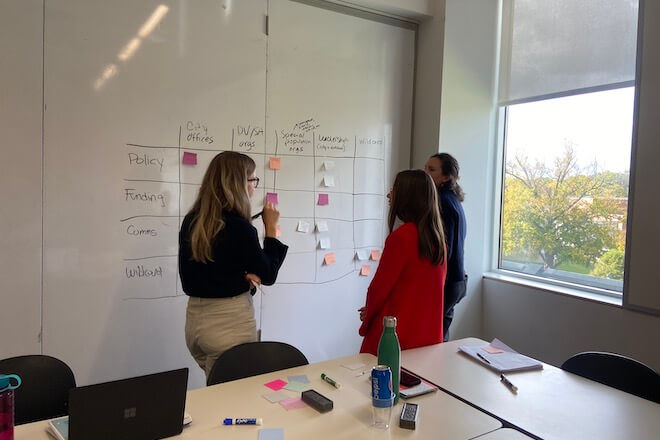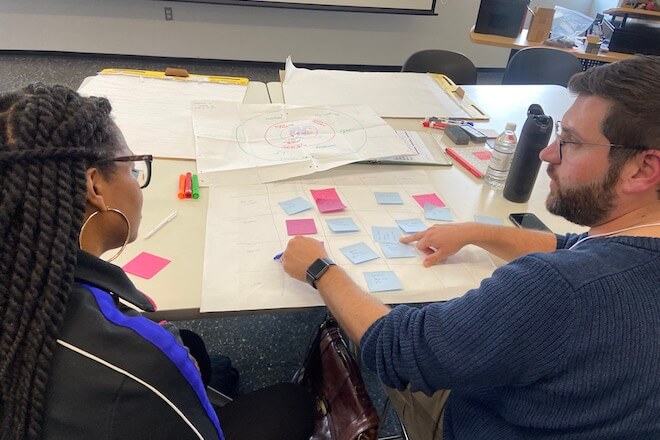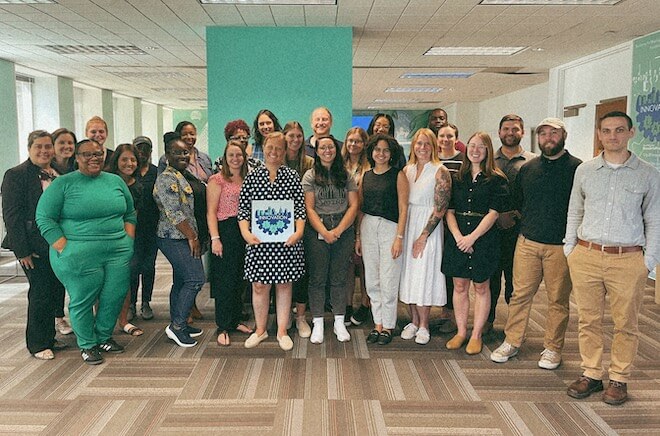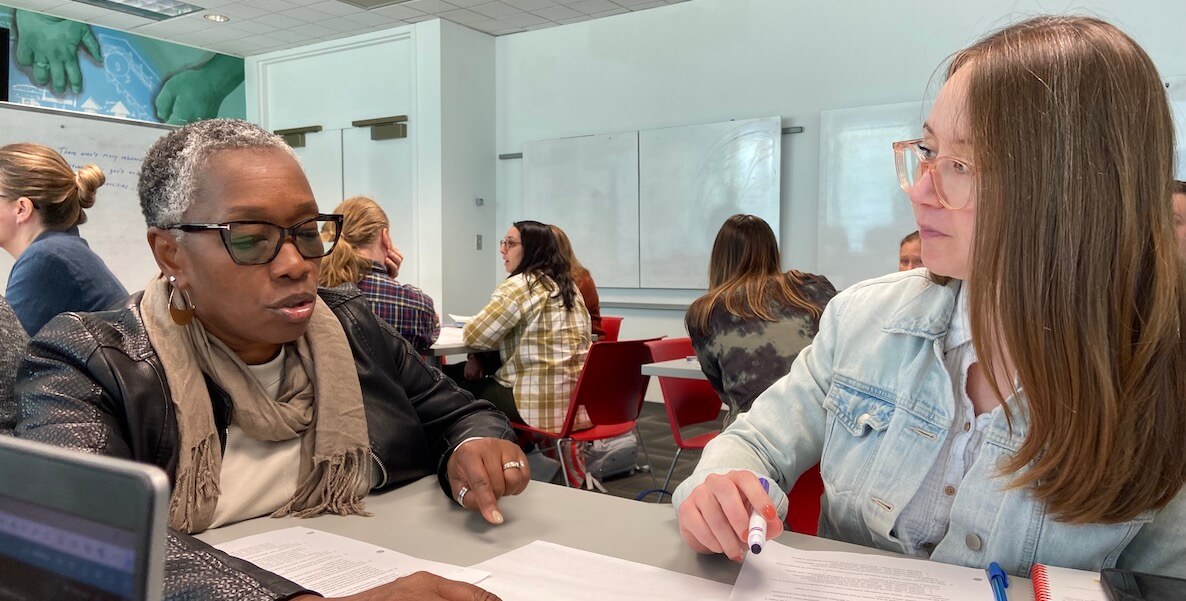At the height of the pandemic, the City of Philadelphia had to provide dozens of updates to its citizens each week. Residents were desperate for Covid testing and up-to-date (and true) information about the virus. Later, they’d desperately seek vaccines. Meanwhile, business owners sought resources to apply for Paycheck Protection Program loans and small business relief funds.
Yet time and time again, citizens told city workers that the city’s programs were inaccessible. Drive-through testing sites excluded non-drivers, including blind people. Non-English speakers couldn’t make heads or tails of the City’s online vaccine information, which relied on less-than-accurate Google Translate. Clearly, many of the municipal offices carrying out these initiatives lacked experience making urgent resources equitable and accessible.
“There were all these community members who weren’t being engaged with really life-saving and essential information,” says Andrea Ngan, community co-design practice lead for the City of Philadelphia’s service design studio, part of the Office of the Chief Administrative Officer.
Luckily, Ngan had learned about the City’s Innovation Fund through the Mayor’s Office of Civic Engagement and Volunteer Service (MOCEVS). So, when she and her colleague Danita Reese, deputy director of the strategic design, wondered: What if there were a single resource that guided city government offices through the process of implementing equitable community engagement so that more people could access critical information and resources, they knew to work with MOCEVS on funding their out-of-the-box solution, taking a step in the direction of improving city services.
“The goal of the innovation ecosystem work is to try to create this network throughout the City, across all of our departments, of people who speak the same language of innovation.” — Andrew Buss, deputy CIO for the Office of Innovation and Technology
Using a $9,000 Innovation Fund grant, Ngan and her colleagues worked with over 80 members of 35 city agencies to get a detailed, overall picture of the challenges the city faces in creating new citizen services. Several months later, having researched internal solutions to an incredibly diverse set of problems, the service design studio, with an additional $549,200 from the Operations Transformation Fund, launched the Equitable Community Engagement Toolkit last June. The kit contains 29 separate guides detailing how city projects can center accessibility, language access and racial equity.
In the past few months alone, the toolkit has helped city workers find local interpreters and source budget resources to compensate citizens for participating in focus groups — helping accomplish highly specific tasks that not only improve city services — but also remove barriers to getting jobs done.
“Prior to having [the Toolkit] written up, it wasn’t clear that you could get gift cards for people, that you could actually provide some of these accommodations. More than anything, it wasn’t clear who you would talk to,” Ngan says.
The Innovation Fund is a program of Philadelphia’s Office of Innovation and Technology, which provides money for internal projects designed to make municipal functions run more smoothly. The fund is part of a broader effort that transforms city bureaucrats into disruptors — an ambitious goal, in a city known for its allergy to systemic change.
A decade in, the fund and its related programs have made modest progress toward these goals. They’ve given out 27 grants to city workers, trained nearly 200 workers in a standalone “Academy,” and reached 1,500 more through 110 departmental workshops. The idea: If they can teach an individual worker to think and collaborate differently, that worker will pass this lesson onto their colleagues, and, ultimately, spread the spirit of innovation throughout city government.
Of course, that’s a lofty goal for a city with 25,000 employees, including some long-timers who may be more than set in their ways. Still, after two mayoral administrations, and now with a new mayor with new energy, a small municipal department is convinced it can make meaningful change, one city worker at a time. Let’s take a look back at what the lil-program-that-could is about — and see if lasting, citywide impact is even remotely realistic.

What the Innovation Team does
During his two terms in office, former Mayor Michael Nutter pushed city government to become more innovative. One of his accomplishments: the City’s small but mighty Innovation Management Team, established in 2013. This group’s task, wrote The Citizen’s Roxanne Patel Shepelavy in 2020: “Create an army of public servants in Philadelphia who make ‘bureaucracy’ an unlikely synonym for creative problem-solving.”
If that sounds ambitious, check out what the team’s former Director of Innovation Eliza Pollack said of the team’s ultimate mission. “Helping government think better.”
From the jump, Philly’s approach to revolutionizing tired city processes and procedures has differed from those of other cities. Andrew Buss, deputy CIO for the Office of Innovation and Technology, says most municipalities have a consulting arm within a mayor’s office that comes into departments and offices to sprinkle their “magic dust” for out-of-the box thinking and then leaves, hoping their changes will stick.
Philadelphia’s three-person team does that, conducting strategic planning and problem solving workshops in specific municipal departments. But they take this work a step further. They bring city workers out of City Hall and into an East Falls-based Innovation Academy, where bureaucrats learn how to turn their ideas for change into realities by thinking big- and small-picture, relying on data, and working collaboratively.
Also, crucially, they provide funding.
Today, Philadelphia’s three-person team includes Buss and Managers Stephanie Orlando and Tara Woody. “The goal of the innovation ecosystem work is to try to create this network throughout the City, across all of our departments, of people who speak the same language of innovation,” Buss says.

Progress report
So far, the office has made modest but meaningful progress toward that goal. Of the City’s over 25,000 employees, 170 have participated in the 8-week Academy, held annually at Thomas Jefferson University main campus.
Meanwhile, the consulting program’s workshops have reached about 1,500 employees since 2014. There are already five workshops scheduled for 2024. And, so far, more than half of the Fund’s 27 (relatively low-cost) grants have translated to permanent city programs. (Grantees usually receive between $6,000 and $10,000.)
The grants have helped fund everything from free menstrual product pantries at Free Libraries to multilingual voter guides and a refrigerator for incarcerated people who work in the orchard at the Philadelphia Department of Prisons’ Industrial Correctional Center to store harvested fruit. Funds to the Department of Licenses and Inspections improved much-needed customer support functionality on their website. The Office of Transportation and Infrastructure Systems won a grant to design a bike rack that prevents cars from parking in front of fire hydrants. (They selected a winner in 2022 and are currently seeking more funding to install the rack.) Even with innovation, the City government still runs… slowly.
In 2023, the fund’s spring round provided grants to three projects. The Mayor’s Office for People with Disabilities (which, thanks to the November 2023 election’s ballot question, will soon become the permanent Office for People with Disabilities) received $15,750 for KultureCity to train the entire municipal workforce on sensory inclusion.
And, two different Department of Public Health (DPH) teams received funds: The Youth Care Team is developing racially diverse and trans-affirming sexual health education materials for city health centers and local healthcare and youth organizations. DPH’s Organized Voices for Action Implementation Team is creating a program to fund organizations working to reduce maternal mortality among Black women.
No one claims the Innovation Team is upending the way City government operates — or even that that is necessarily a wise goal. Its proponents argue that incremental change can create a consequential shift in how government serves its customers — Philadelphia residents.
“In city government … there’s never downtime. There’s always a city to run … The ability to go to this Innovation Academy and dedicate time out of your week to sit down and say, Okay, we have our problems that we need to solve today, but this afternoon I’m going to sit down and talk about how we can make this better in the future, is just a really powerful opportunity.” — Tyler Barile, Streets Department
Learning to problem solve
During a 2023 Academy session, Kadidja Nanakasse, diversity, equity and inclusion coordinator for the city’s Law Department, worked on a list of stakeholders who could potentially be impacted by an unsupportive work environment.
As she worked, her colleagues from other city departments pointed out people she never would have considered. An unsupportive work environment could spill over into tension and frustration at home, for example. “I never would’ve thought about families being stakeholders,” Nanakasse says. “Having someone point that out to me almost changed my entire problem or perspective on finding a solution.”
Collaboration among city workers is exactly what the Academy is meant to foster. Drawing from business analytics, ethnographic research and other disciplines in order to hone students’ ability to find and implement novel, unstale solutions, the curriculum covers five tenets for an innovative workplace: integrated design processes, business and operations models, systems thinking, research methods and entrepreneurial leadership.
Academy students learn design thinking, developing the ability to empathize beyond their immediate professional and personal circles, challenging preconceived notions, and establishing a shared language around problem solving that city workers can share and use to work together.
Orlando emphasizes that attendees may not solve the specific problem they came with. They will, however, develop overall problem-solving strategies to share with their departments, imparting the lessons they learned and spreading that common language.
Alumni can apply for Innovation Grants, either to implement some of the solutions they started working on during the Academy, or to launch a project based on a wholly new idea. One employee in the Office of Children and Families (OCF) who attended the Academy received funds from the program to create a map of all OCF’s resources. Today, that map, updated monthly, “helps OCF staff visualize its footprint across the city and helps users identify which resources may best fit a family’s needs,” says Brittan Hallar, OCF’s chief of performance management and technology. This tool comes in handy in a city where close to one third of all children live in poverty.
Tyler Barile is the assistant chief construction engineer for the Streets Department and a 2023 Academy alum. Now that he’s been through the curriculum, he can’t stop recommending the program to other Streets Department employees — not just for the new ideas it generates, but also for the window it provides to the bigger picture. “In city government … there’s never downtime; there’s always a city to run; there’s always something to be done,” he says.
“I think the ability to go to this Innovation Academy and dedicate time out of your week to sit down and say, Okay, we have our problems that we need to solve today, but this afternoon I’m going to sit down and talk about how we can make this better in the future, is just a really powerful opportunity.”

The future of the Innovation Team
The Innovation Team is currently looking for ways to continue expanding their efforts to spread creative-work thinking across the city by exploring professional development opportunities for Academy alumni to reinforce the skills they learned there. They’re also considering a training program that would allow alumni to facilitate some of the consulting work they do. And, they would like to strengthen research- and data collection-centered partnerships with universities.
One way they’re expanding their efforts is by including SEPTA employees — starting with four this year. Emily Yates, SEPTA’s deputy chief planning officer focused on innovation, is a long-time fan. She is hoping it can do for the transit agency what it’s done for city government.
Mayor Cherelle Parker just started her term in office; it’s unclear how the Innovation Team will fit into her plans. But Buss is optimistic. When the Kenney administration began, new departmental leadership wanted to roll back the team’s efforts and make themselves into a more traditional public sector technology office. But the existing team was able to defend their work — and were spared from the City’s post-Covid budget cuts.
With Parker, they feel their efforts are in line with her vision for a “safer, cleaner, greener, [Philly] with economic opportunity for all.” Buss is betting that Parker’s practical, get-it-done attitude will lead her to buy into the argument that small changes in how individual workers, teams or departments do their job can transform the city — resulting in a more transparent government and better access to municipal services for all Philadelphians.
To hear his team tell it, it’s always New Year’s Day in their office. “It’s really inspiring and remotivating and reinvigorating, especially in the time that we’re currently in where there’s a lot of change and transition happening, to be in a room with 20 different city employees and four SEPTA employees who are just so committed and excited to be there every day,” Orlando says.
![]() MORE ON REMAKING CITY GOVERNMENT FROM THE CITIZEN
MORE ON REMAKING CITY GOVERNMENT FROM THE CITIZEN





